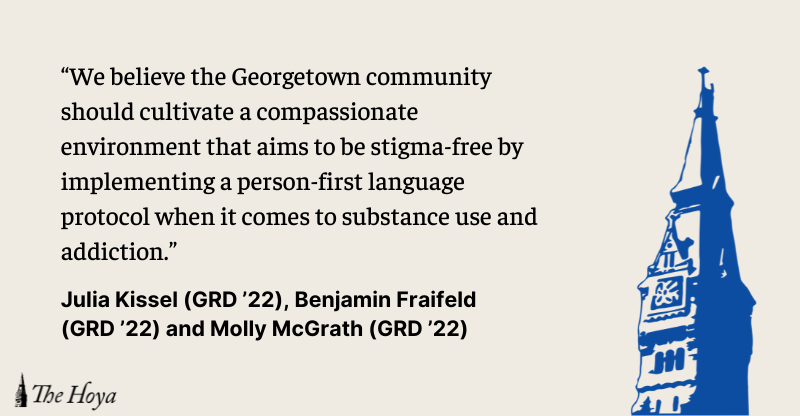CW: This article discusses addiction and substance use. Please refer to the end of the article for on- and off-campus resources.
In Summer 2021, the inaugural Addiction Policy and Practice cohort met in class. In this unique Master of Science program based in the Graduate School of Arts and Sciences, led by Director Regina LaBelle, we have had the opportunity to delve into the literature of addiction psychiatry, neurobiology, the United States’ drug policy and the financing of healthcare, among other topics. Our cohort quickly realized we all arrived ready to tackle a preeminent challenge facing our communities.
The U.S. drug overdose mortality rate reached a new apex in 2021 with the Centers for Disease Control and Prevention (CDC) estimating that over 101,000 people died of drug overdoses in a 12-month period.
While tied to the proliferation of fentanyl, the increase is, in part, associated with a wide treatment gap created by complex health inequities and barriers in access to evidence-based treatment for substance use disorder (SUD).
Stigma, or the processes of labeling, stereotyping, status loss and discrimination, drives many of our discussions about addiction policy. Our assignments in class often focus on the negative impact of stigma on people who use drugs and people living with SUDs. For example, recent sensationalized headlines over a $30 million federal harm reduction grant, which provides life-saving equipment like naloxone and sterile syringes, villainized and sought to end the provision of safe smoking supplies that reduce risk of harm, on the basis of historically racialized dogma.
Despite stigma’s centrality to our conversations and the recognition of its pervasiveness by our professors, we have encountered uncomfortable moments with the stigma surrounding people who use drugs or people with SUDs in the broader Georgetown community.
These situations reveal a disconnect between the discussions we have among our cohort and the tenor of conversations throughout Georgetown more broadly.
As expressed in the National Institute on Drug Abuse’s national survey Monitoring the Future, substance use is common and prevalent among college students, and certainly, among our own students. We believe the Georgetown community should cultivate a compassionate environment that aims to be stigma-free by implementing a person-first language protocol when it comes to substance use and addiction.
The language we use when speaking about substance use is the common thread of this disconnect, and our cohort believes that a change in language can provoke a steep reduction in stigma-related barriers to SUD treatment.
People who use drugs or are living with SUDs face stigma that directly impacts their access to and quality of care at the individual and policy levels. When dealing with these issues, words are a matter of life and death.
Stigma, including internalized stigma or negative self-value, can impede recovery by encouraging a recurrence of use or preventing an individual from seeking and adhering to treatment.
Addiction is a disease that affects a person’s brain and behavior; it causes changes to brain circuits and function that lead to an inability to control use, despite the consequences. Stigmatizing words, like “addict” or “alcoholic,” are rooted in the belief that addiction is a moral choice, rather than a medical problem. A 2010 study of medical professionals found that people are more likely to blame someone for their addiction when they are described as a “substance abuser” rather than as someone living with “a substance use disorder.” Researchers found that these labels have strong negative associations which influenced medical practitioners’ perceptions to recommend punitive rather than therapeutic measures.
The Georgetown community should adopt the use of person-first language when speaking about people with addiction. Person-first language refers to a person first, and any disability, disorder or characteristic second.
Georgetown should follow the lead of the Associated Press Stylebook, which in 2017 offered new guidance to avoid stigmatizing addiction in news media. For example, AP advises avoiding the word “abuse” or “problem.” The word “use” should be modified with words like “risky,” “unhealthy,” or “heavy.” Prioritize phrases like “they were addicted” and “they used drugs” over words like “addict,” “alcoholic,” and “abuser.”
The Georgetown community should strive to use this language and eliminate other words and phrases in all academic forums. As members of this community, we must use our positions of privilege to educate others and change the narrative.
Julia Kissel is a student in the Graduate School of Arts and Sciences. Benjamin Fraifeld is a student in the Graduate School of Arts and Sciences. Molly McGrath is a student in the Graduate School of Arts and Sciences.
Resources: On-campus resources include Health Education Services (202-687-8949) and Counseling and Psychiatric Services (202-687-6985). Additional off-campus resources include the Crisis Text Line (text 741741) and free naloxone kits by texting LiveLongDC to 888-111.









